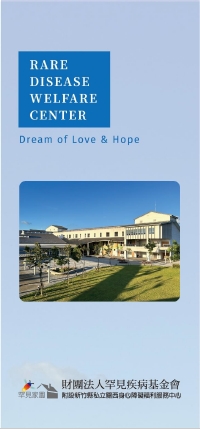|
罕見家園(英文版)
內容介紹:
"TFRD is about to enter the 2nd decade, and we have to formulate new vision and objectives that are forward-looking." Foundation for Rare Disorders (TFRD). At the time, the founder Serena Wu and co-founder Prof. Min-Chieh Tseng, were pondering that "TFRD is about to enter the 2nd decade, and we have to formulate new vision and objectives that are forward-looking." We wish to establish a fully integrated service center tailor-made for rare disease families. The center is to provide various programs that release patients and caregivers from their daily routine. TFRD is to offer innovative programs on site such as psychological counseling, farming, horticultural therapy, baking and cooking, etc. All is to let rare disease families store up some energy and courage to confront the trails of life. The Welfare Device Service Center adopts an optimal care environment for patients with moderate and severe conditions, facilitated with comprehensive home bathing equipment, mobile assistive devices, and small soothing items. Additionally, the Center also offers bathing experience programs, with expert personnel assessing patients' limb movements and head-neck coordination, and providing guidance to family members on utilizing bathing facilities. Patients are given the opportunity to plant crops on the farm, providing them with hands-on agricultural education, while horticultural therapy sessions allow patients to further relax. Moreover, the Playground & Inclusive Space provide children with exclusive play zone. On the Stargazing Hill and lawn, patients can relax, camp, and observe the stars, and can also participate in animal-assisted therapy that combine feeding chickens. Extending its focus from rare diseases to broader societal education, the Gene Education Center combines with science and life education. Through interactive exhibitions at the Gene Education Center , visitors could deepen their understanding of genetic diseases and gain insights into the daily lives of families affected by rare diseases. |




